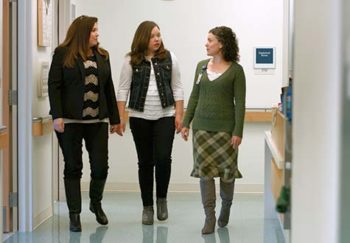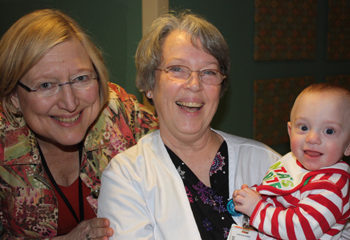
Pregnant for the fourth time, Megan and James Watson felt pretty familiar with the ins and outs of having a baby. But Hirschsprung disease? They’d never heard of it.
Megan remembers being blindsided when Lennox was born. No one expects their newborn to have issues; but the shock was even greater for the Watsons, because it seemed like they’d received so much monitoring and care leading up to their son’s birth. Megan had been getting ultrasounds 3 times a week, due to an umbilical cord issue. “We knew he was small.”
Lennox weighed 4.7 pounds when he was born at 37.5 weeks. Despite his size, he seemed normal and healthy.
“He nursed right way. There was no indication that there was anything wrong.”
The Symptoms Begin
The next day, however, Lennox wouldn’t nurse. When he finally did, he spat up green bile. “I’d never seen it before, but I didn’t think anything of it,” Megan says.
“At midnight, when it happened again, another nurse happened to be in the room checking my stats and I told her he’d been spitting up this light green foam.” By 3 a.m., a head nurse told Megan her baby was NPO, or unable to be fed by mouth. “She told me, ‘I think he has an obstruction in his intestines, and we need to do an X-ray to figure out what it is.’”
Exhausted, Megan tried not to worry, knowing she needed to rest in case the news didn’t get better.
And it didn’t. That morning, their pediatrician told Megan and James that Lennox did in fact have a block in his large intestine. He would need to go to the NICU at UVA.
“As he was walking out the door, (the doctor) said, ‘I think he has Hirschsprung disease. Don’t look it up on the internet.’”
To which Megan said, “You know that’s the first thing I’m going to do!”
Next Steps at the UVA NICU
Two hours later, the UVA transfer team, NETS, for children arrived and began strapping baby Lennox into what Megan describes as a “sophisticated transfer safety box.”
Megan had to wait for her staples to be removed before she could follow him. Her husband, James, went with Lennox, and, though it took a certain amount of ferocity, Megan made it there by noon.
At first, the doctors didn’t have answers. “They told us it was an obstruction, that it looked like waste. It could be sticky poop, it could be cystic fibrosis, it could it be a billion things. He could get irrigated and be fine.” But for nine days, no one was sure of a diagnosis.
Those nine days were hard. Megan couldn’t nurse her infant, because he was still designated “nothing by mouth.” Meanwhile, the UVA team irrigated Lennox’s bowels and “scoped him up and down.” There was hope. It was possible that the obstruction was just sticky meconium, the fecal waste a baby produces in the uterus.
Looking back, Megan now knows that the green spit-up and the lack of a stool were two key symptoms of Hirschsprung disease (HD).
So, What Exactly IS Hirschsprung Disease?
Megan explains in a way that makes it clear she’s become something of an expert on the topic.
The colon is an active organ, lined with ganglionic nerve cells that help push out the waste. And when you have Hirschsprung disease, a portion of your colon is missing these nerve cells, so the waste gets stuck. Without intervention, this stool can back up and flood a baby’s body with toxins that can lead to death.
To determine if Lennox was indeed missing the crucial ganglionic nerve cells, doctors had to biopsy his large intestine.
The results were positive. Lennox had HD.
“Fortunately, it was just an inch and a half of his intestine missing the cells,” Megan says. In many ways, they had the best of the worst. “Some kids have total colonic HD,” she explains.
And it’s a rare disease that is still being studied. Megan went online to get answers and found that doctors are trying to find them, too. “Some journals said HD occurs 1 in 5,000, but others say 1 in 7,000. Some medical journals say it’s genetic, other say it’s not.”
One Mother’s Advice to Parents of Children with HD
- Tread lightly on the internet: Megan recommends only reputable sites, not group chats and blogs, for researching rare conditions.
- Ask until you’re absolutely clear on what the doctor’s saying. You’re your child’s only advocate.
- Be flexible.
- Ask about probiotics. They’ve been essential for Lennox’s gut health.
- Follow the post-surgery care instructions – if you don’t think you’re doing it right, have the surgeon show you.
Decision Time
Sara Rassmusen, MD, and her team of pediatric surgeons spent time talking with Megan and James about the options. “We had a multidisciplinary decision-making process that included the NICU staff, surgeons, anesthesiologists,” says Rassmusen. “I remember vividly sitting with Megan in the NICU. I know she was scared.”
Normally, a baby with Hirschsprung disease has a pull-through surgery, which removes the unhealthy colon and connects the healthy parts. But Lennox was a very small baby. And a pull-through surgery takes 4 hours.
In the end, everyone felt Lennox would be better served with a two-stage operation: “Ostomy first, then the pull-through procedure when Lennox was older and bigger.”
The one-hour ostomy procedure bisects the intestines where the nerve cells stop and begin, ties off the part without nerve cells, and reroutes the colon to the outside of the body. Waste then leaves the body via a stoma, a surgically created opening.
“They showed us how to clean it, and within 24 hours we were home.”
Finally Coming Home
Taking Lennox home for the first time, Megan and James felt relief. “That felt like a very glorious moment. After the stress of being back and forth and caring for our other kids, it was nice to just be exhausted — spent emotionally and physically — in our own home.”
About the experience, Megan feels gratitude. “We were thankful people heard us. Thankful they didn’t talk to us like we were idiots. The doctors appreciated us asking intelligent questions and answered us intelligently. And no thinking, ‘I’m the doctor and you’re not.’”
For Megan, this respect and communication was key part of her experience as a mother of a sick infant. “The NICU nurses were fantastic. The pediatric team was really great at communicating. The only pediatric surgery of its kind in the area, people come from all over. I can’t say enough about the nurses and the surgeons, who were really great at communicating with us.”
The Pull-Through Surgery
Lennox went in for the surgery at 4 months old. The procedure removed the part of the intestine lacking nerve cells, connecting the healthy part to his anal opening. At that point he weighed 11 pounds, meeting the requirement of having a weight in the double digits.
Prior to the surgery, Megan researched as much as she could on babies and anesthesia.
“At the end of the day, I had to let it go and not be a control freak about the whole thing. I had to trust that this happens all the time, every day, and this is what they do and it will work out. Maybe he won’t invent the new version of the internet because he was anesthetized twice before he was 4 months old, but he’ll be OK.”
The surgery was a success. In Megan’s opinion, “UVA has fantastic pediatric surgeons with great expertise in children’s colorectal diseases.”
That wasn’t the end of the challenges. Within a month, Lennox was hospitalized two more times with enterocolitis —digestive tract inflammation — which occurs when you become constipated and your stool backs up. “His colon didn’t know how to tell his brain to poop,” Megan says.
Critical Care for Infants
Lennox’s recovery from Hirschsprung disease was made possible by several expert teams at UVA Children’s Hospital:
A Bright Future
Since then, however, Lennox has flourished. “He is fantastic. His pooper is working just fine. I never thought in a million years that I would be so happy or talk so much about poop.”
Lennox will need to eat healthy foods and exercise to avoid constipation, but otherwise, he’s developmentally right on track and should have a normal life.
“There may be some issues with potty training – but as I’m finding out with Xavier, my 2-year-old, that’s a boy thing,” she laughs. At that, Lennox comes crawling into the kitchen, bright-eyed and moving fast.


Our little boy has this. He pooped and ate like normal at first then started getting sick a lot. He unfortunately has no nerve cells in his large intestines or his colon which surprised all the doctors and nurses. We are still waiting for his pull through surgery. They said his poop has to be more solid before they will do that. Never would have imagined praying for solid poop.
Hi, my baby boy was diagnosed with HD, he already had his pull through procedure done..but within 1 week he got an inflammation in his large intestine, so he had to get another surgery to get a stoma bag put back on..I’m so scared for his next pull through surgery ..is there anything you could tell me or advice me to put my mind at ease, my heart hurts for my baby,,please help
Christina, it sounds like you’re going through a lot, and of course, as a parent, your heart just breaks for your child’s suffering. Hopefully, your healthcare team has experience with these procedures. Have you searched online for other parents with kids who have HD? You can find a lot of support from people who have been through it or are still going through it, like you. Best of luck!!
Our son, who is now 19 has Long Segment Hirschsprung Disease. He does amazingly well but does have rough patches at times. He continues to have inflammation but overall is healthy. In the beginning, I could not process what was going on. I honestly must admit that it took years for me to understand his specific condition and the reasoning for a total colon removal. We take one day at a time and have been under the care of the same gastroenterologist since birth. I am so thankful that we have a top notch care provider that understands Hirschsprung disease. For us, what made a huge difference was having a care provider that was honest with us. He and his staff have always shown empathy and care for our son and are always available when there is a medical crisis.
My son is 16 months old and has HD had his pull through operation at 3 months fortunately he’s healthy and before this we managed his with rectul washouts at home since his pull through last January touch wood he’s been great a lovely boy never been to hospital again having checkups I believe his future is in Gods perfect hands am really greatfull as the beginning was the hardest. He didn’t pass his 1st poop and were still sent home then midwife sent us to a different hospital the next day where he was given suposetries then when he emptied himself were sent home next day with all clear only to go back to hospital 2 days later as he was off his feed obviously if u feed without emptying,back then they wanted to give him another supposetries then I refused requested more checks. Now he’s growing fine but get saw bottom but not as much these days. Hopefully he will grow out of it. Be positive and strong.
My son is now 7 months old but he was also born with HD. At 2 weeks old he had the pull through surgery done. Everything came out great the surgery was successful and he was pooping normal. As he got old we noticed a change in his growth. The pediatrician would always raise an eyebrow saying he’s not gaining he needs eat more. I feed him until he doesn’t want to eat anymore. So it’s kind of worried sum because he’s so small for 7 months. I’m still trying to understand his condition but it’s hard when there’s not much to read on. So i was wondering does anyone has or have this same concern like me. My son weighs 13.5 lbs and he’s 7 months. Is this normal for a baby with HD?
Jessie, Thanks for sharing your story! We can’t offer medical advice here, unfortunately. All babies are different, and only a doctor examining your son could answer what is normal for him. We encourage you to talk to your pediatrician or maybe get a second opinion! We wish you the best.